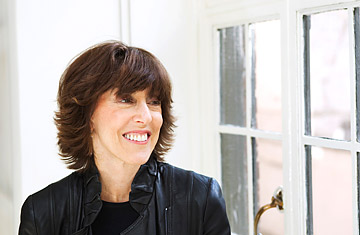
Writer-director Nora Ephron at her home in New York City
Nora Ephron has met Eleanor Roosevelt. She has penned hit movies, like When Harry Met Sally, and has had a few flops. She has also had a meat loaf named after her. In her new collection of essays, the writer-director covers all this and more. Four years after addressing the subject of aging in the best seller I Feel Bad About My Neck, Ephron is out with the unforgettably titled I Remember Nothing and Other Reflections. She spoke with TIME about the myth of the egg-white omelet and how e-mail has changed since her film You've Got Mail.
In the title essay, you address forgetting things. As far as you're aware, have you forgotten anything today?
It's been a good day so far. I have not forgotten anything, although I might have and forgot what I forgot. I'm not kidding. I think there was the name of something I forgot. There was. But I forget what it was!
In the essay "The O Word," you distinguish old from really old. What do you see yourself doing when you're really old?
Well, that's the thing. First of all, you don't know if you're going to get to be really old. And second of all, you have no idea if you do get there what's going to be wrong with you. Because something will be. Which is one reason why it's so important to eat those doughnuts now, because at some point you might not be able to digest them.
Do you have a sense of relief now that you've expressed your feelings about egg-white omelets?
I do. Although I have no hope at all that anyone is going to listen to me. I've never felt so like a voice crying in the wilderness as I do about egg-white omelets. It doesn't matter how clearly you express yourself, they [can't] believe that egg yolks don't cause high cholesterol. But it's just not true.
Your collection ranges widely, from subjects like those egg-white omelets to divorce. Is there any topic that you consider off-limits?
Sure. Some things are private. And nobody really wants to know everything about you — although I notice, reading some things on the Internet, that rule doesn't necessarily seem to apply to everyone. It never crossed my mind, ever, that people would be remotely interested in whether someone ordered a Diet Coke at 4 o'clock today.
If you were starting off as a writer today, do you think you'd have your own blog?
There's no telling. If I were the same insane blabbermouth that I used to be, I probably would have my own blog.
Your feelings about e-mail have changed since writing You've Got Mail.
Yes. I feel about e-mail the way you feel about an old boyfriend that you meet and think, What did I ever see in him? I was in on the very beginning and I knew about five people on e-mail, and we wrote things to one another. We didn't write "Lunch?" or "Tuesday night?" The Democratic National Committee did not have my e-mail address, and that moment when that voice said, "You've got mail" was so unbelievably exciting and romantic and then — suddenly there were 112 unanswered e-mails, many of them asking for money.
Your most recent movie was Julie & Julia, and you include several recipes in this book. Have you thought about a cookbook?
Yes. But do you realize how hard it is to write a cookbook? You have to make sure all the measurements are correct, which is something you don't have to do if you're somebody like me who's just a pretty good home cook. And you have to test things. What [could] be worse?
Did you ever think you'd be able to write about a subject as serious as your mother's alcoholism?
I've written about my mother's death before. This is a different look at it. In the way I grew up, we knew that you might write about almost anything if you could just find a way to tell the story — that was what we believed in our house, that was religion in our house. Everything was copy. I've written this in an old piece, but when my mother was dying in the hospital, she looked at me and said, "You're a reporter, Nora, take notes."
You've witnessed some very historic events. You went to march on Washington in 1967 and saw the Beatles at the Ed Sullivan Theater. You met Eleanor Roosevelt. Is there one thing you really wish you could remember a little bit more?
There's some people I met that I not only wish I remembered more about, but I wish I had had the sense to ask them more questions — people you always wanted to meet that you didn't ask even some dopey question to. I feel that I was way too respectful of some of the people I met, like Cary Grant, whom I should have just plopped myself next to and peppered with questions.
What bothers you more these days: your neck or that not-quite-bald space prone to appear on the back of your head, which you've dubbed your Aruba?
I almost look back on the period of feeling bad about my neck as my youth, in that there are so many worse things in your future than the disintegration of your neck.
That was only four years ago, right?
Yes, I know. And yet there's a big difference between mid-60s and late 60s, let me tell you.
